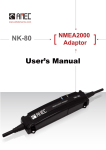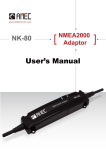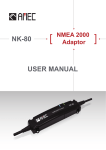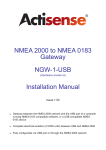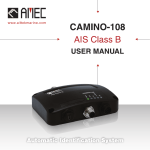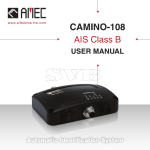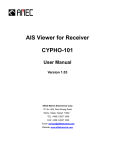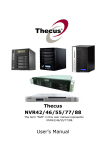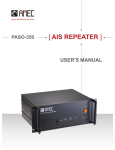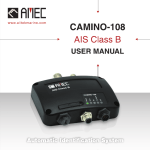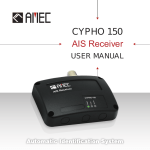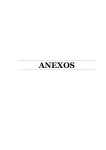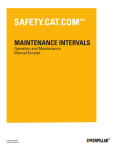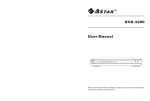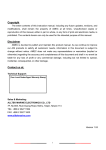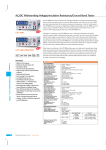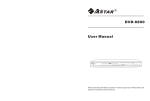Download User`s Manual
Transcript
User’s Manual II COPYRIGHT The entire contents of this instruction manual, including any future updates, revisions, and modifications, shall remain the properties of AMEC at all times. Unauthorized copies or reproductions of this manual, either partial or whole, in any form of print and electronic media, are prohibited. The equipment mentioned in this manual can only be used in accordance with instructions contained in this manual. DISCLAIMER AMEC is devoted to publish and maintain this document. As we continue to improve our products and manuals, information presented in this document is subject to change without notice. AMEC does not make any representations or warranties (implied or otherwise) regarding the accuracy and completeness of this document and shall in no event be liable for any loss of profit or any commercial damages, including but not limited to special, incidental, consequential, or other damages. Contact us at: (Your Local Dealer/Agent Warranty Stamp) Technical Support: Sales & Marketing: Version 1.07 ALLTEK MARINE ELECTRONICS CO., LTD 7F, No. 605, Ruei-Guang Rd., Neihu, Taipei, Taiwan 114 TEL: +886 2 2627 1599 FAX: +886 2 2627 1600 www.alltekmarine.com I WARNING! The equipment said in this manual must only be used to which it was designed. Improper operation or installation may cause damage to the equipment. AMEC will not incur any liability as a result of equipment damage or data loss due to improper usage or installation of the equipment. It is strongly recommended reading this manual and the following safety instructions before proceeding to the installation or operation. WARNING WARNING PLEASE KEEP AWAY FROM DIRECT WATER CONTACT. ELECTRICAL SHOCK HAZARD. Even though the equipment is waterproof, it is recommended to keep water away from reach. Water leaking into the equipment may cause electrical shock or fire. Do not disassemble the equipment. Only qualified personnel should service the product. TURN OFF THE POWER IMMEDIATELY IF WATER LEAKS IN OR OBJECT DROPS ONTO THE EQUIPMENT. AVOID OPERATING THE EQUIPMENT WITH WET HANDS. Despite the fact that it is safe, but like any other electric appliances, Continue operating the equipment operate with dry hands. could cause electrical shock or fire. Contact your nearest distributor for service. II FOREWORD Congratulations on the purchase of NK-80 NMEA 2000 adaptor. NK-80 NMEA 2000 adaptor is clever designed to enable communication between NMEA 2000 and NMEA 0183. Unless improper used, installed, or maintained, the equipment should perform at its optimum. The operation instructions contained in this manual is applied only to NK-80. AMEC and the authorized local agent/dealer will not bear any responsibilities of damages resulted from improper installations made by unauthorized agent/dealer. We thank you for choosing our product III Table of Contents Page 1. NK-80 Introduction ........................................................1 1.1. What is NMEA 2000?.............................................................. 1 1.2. NK-80 Overview...................................................................... 1 2. Installation ......................................................................2 2.1. Items in the Package ............................................................. 2 2.2. Connection ............................................................................. 3 2.2.1. NMEA 2000 Connections ................................................ 3 2.2.2. NMEA 0183 Connections ................................................ 4 3. Operation ........................................................................6 3.1. Operation in NMEA 2000 Network......................................... 6 3.2. LED Indication ........................................................................ 7 3.3. Configuration Utility .............................................................. 8 3.3.1. Change NMEA 0183 Default Baud Rate (38,400 bps) .. 11 3.3.2. Filter NMEA 0183 / NMEA 2000 Output Messages ....... 12 3.3.3. Save NMEA 0183 Output Message Log ........................ 14 4. Appendix ......................................................................16 4.1. Product Specifications ........................................................ 16 4.2. Dimension ............................................................................ 17 4.3. PGN Information .................................................................. 18 4.4. NMEA0183 Information ........................................................ 20 5. FCC INTERFERENCE STATEMENT ............................21 6. DECLARATION OF CONFORMITY..............................21 IV 1. NK-80 Introduction 1.1. What is NMEA 2000? The NMEA 2000 transmits data through Controller Area Network (Can Bus). It simplifies the connections and enables information sharing among different devices through a single trunk cable. Compared with NMEA 0183 in “RS422” interface, NMEA 2000 has better transmission reliability and shares data easier in a network. 1.2. NK-80 Overview NK-80 NMEA 2000 adaptor (as known as NK-80) is a gateway between NMEA 0183 electronic devices and NMEA 2000 device/network. NK-80 allows users to connect their existing NMEA 1083 devices to the NMEA 2000 network. The key features of NK-80 are shown as follows: High-Performance 32-bit RISC CPU has a performance of 80 DMIPS to manage high traffic loading of NMEA data transactions. Build-in memory storage with 64KB RAM and 256KB Flash ROM, it is more effective to control the dataflow. Configurable through a serial connection allows users to monitor/control NMEA data transactions. 1 NMEA 2000 Certified ensures product quality is reliable in most extreme conditions. Isolated power is provided through NMEA 2000 network, NK80 requires no additional battery source. Fully galvanically isolated for electrical spike protection 2. Installation 2.1. Items in the Package The NK-80 standard package is listed in Table 2.1. It is also illustrated in Figure 2.1. Table 2.1 Standard Equipment List No. Description 1 AMEC NK-80 NMEA 2000 adaptor 1 2 Manual 1 3 Screw M4 4 4 CD 1 1. NK-80x1 Qty 2. Manualx1 Figure 2.1 3. Screw M4x4 Standard Package 2 4. CDx1 2.2. Connection Diagram below shows the physical attributes of NK-80. NMEA0183 NMEA2000 Micro-C male LED 1 LED 2 0.1 meter 1 meter 2.2.1.NMEA 2000 Connections The Micro-C male connector is an NMEA 2000 standard connector. Connect this connector to any available Micro-C female connector in the NMEA2000 network. NET-S Shield 2 NET-C 3 3 1 5 3 3 4 NET-H 3 3 NET-L Figure 2.2.1 Pin Definitions of the Micro-C Male Connector 3 2.2.2.NMEA 0183 Connections The NMEA 0183 cable provides flexible wiring to devices. Please follow the NMEA 0183 cable description below when wiring to an NMEA 0183 device. Table 2.2.2. Wire Information for NMEA 0183 Cable Pin Wire color Name Function TXP Positive(+); NMEA 0183 Data output 1 RED 2 GREEN TXN Negative (-); NMEA 0183 Data output 3 BLACK RXP Positive(+); NMEA 0183 Data input 4 BLUE 5 SHIELD RXN Negative (-); NMEA 0183 Data input GND Ground Wiring NMEA 0183 to NMEA 0183/RS-422 Device Please follow the wiring diagram below to connect an NMEA 0183/RS-422 device. NK-80 NMEA 0183 NMEA 0183/RS-422 device TXP RXP TXN RXN RXP TXP RXN TXN Figure 2.2.2.1-1 NMEA 0183 to RS-422 Connection NOTE: Please ensure the connecting device is fully NMEA 0183 compliant. 4 Wiring NMEA 0183 to RS-232/PC Please follow the wiring diagram below to connect to RS-232/PC NK-80 NMEA 0183 RS-232/PC TXP RX TXN GND RXP TX RXN GND Figure 2.2.2.1-2 NMEA 0183 to RS-232 Connection NOTE: Please ensure the wire definitions of RS-232/PC are correct during wiring. 5 3. Operation 3.1. Operation in NMEA 2000 Network NK-80 NMEA 2000 adaptor converts messages from NMEA 2000 to NMEA 0183 and vice versa. NK-80 enables NMEA 0183 devices to communicate to a NMEA 2000 network. Figure 3.1 NK-80 in an NMEA 2000 Network (reference from NMEA association) 6 3.2. LED Indication NK-80 has two LED indicators: LED 1 and LED 2. LED 1 flashes blue light when processing/receiving NMEA 2000 messages. LED 2 flashes green light when processing/receiving NMEA 0183 messages. Figure 3.2 LED Indication of NK-80 The details on indicators statuses are shown in the following table. Table 3.2 Description of Indicator Statuses Indication Status LED 1 ●(Blue) Flash LED 2 ●(Green) Flash LED 1 ●(Blue) LED 2 ●(Green) Flash simultaneously in a 5 seconds interval Normal Operation Steady During Firmware Upgrading Flash takes more than 5 seconds System/Power Failure* LED 1 ●(Blue) LED 2 ●(Green) LED 1 ●(Blue) LED 2 ●(Green) Description Receiving NMEA 2000 messages Receiving NMEA 0183 messages *NOTE: If it takes more than 5 seconds to see LED activities, please verify your NMEA 2000 network power output voltage. 7 3.3. Configuration Utility In a general usage, no configuration is required for the NK-80 NMEA 2000 adaptor to work. For advanced operations*, NK-80 provides the following configuration settings. Change default NMEA 0183 baud rate (38,400 bps) Filter NMEA 0183 / NMEA 2000 output messages Save NMEA 0183 output message log How to configure NK-80 NMEA 2000 adaptor? Step 1: Connect NK-80 NMEA 2000 adaptor to PC through RS-232/USB and ensure power is available from the NMEA 2000 network. *NOTE: PC connection is required for advanced configuration. 8 Step 2: Run AMEC NMEA Configuration utility. Figure 3.3-1 AMEC NMEA Configuration Utility 9 Step 3: Manually enter port value and NMEA 0183 baud rate. If unknown, choose Auto. Now, click Connect to connect NK-80. Figure 3.3-2 Configuration Utility Connected to PC 10 3.3.1.Change NMEA 0183 Default Baud Rate (38,400 bps) At the PROPERTIES tab, click on the Change NMEA Baud Rate button. Choose the desired baud rate and click on the Apply button. Figure 3.3.1 Properties Tab 11 3.3.2.Filter NMEA 0183 / NMEA 2000 Output Messages Step 1: At the CONFIGURATION tab, expand the message list on the left and click on a desired message to configure. Figure 3.3.2-1 NMEA Message Filtering HINT: Double click to expand the message groups will show their message names. 12 Step 2: Once clicked on the desired message, the message properties will reveal on the right panel. On the panel choose the needed attributes and click on Apply. Figure 3.3.2-2 NMEA Message Filtering Note: All message settings are enabled in factory default. The Default button restores all message settings back to factory default. 13 3.3.3.Save NMEA 0183 Output Message Log Click on the NMEA 0183 DATA VIEW (OUTPUT) tab to view message log history. To record a log session, click on the disk button to start recording. The system will prompt you first to save the log. It continues logging till the icon is click again. Figure 3.3.3-1 NMEA 0183 Data Log NOTE: NK-80 configuration utility can only log NMEA 0183 output sentences processed from NMEA 2000 messages. 14 Shown below is the content of a log file. Figure 3.3.3-2 A Sample Log File 15 4. Appendix 4.1. Product Specifications APPLICABLE STANDARDS NMEA 2000 standard version1.2 (2004) CERTIFICATIONS NMEA 2000 ® NMEA 2000 CAN Bus line Transmitter Parameter Conditions Min. Max. Recessive bus voltage VTXD = VDD; no load. 2.0V. 3.0V. Dominant bus voltage NET-H VTXD = 0.8V 2.75V 4.5V Dominant bus voltage NET-L VTXD = 0.8V 0.5V 2.25V Recessive differential output voltage VTXD = 2V; no load -500mV 50mV Dominant differential output voltage 40Ω < RL < 60Ω 1.5V 3.0V NMEA 2000 CAN Bus line Receiver NET-H, NET-L common-mode input resistance typical 100 KΩ Differential input resistance typical 100 KΩ Input/Output Configurable 4,800, 9,600, 38,400 (default), Baud rate 57,600, 115,200 bps Environmental Operation Temperature -20°C~+55°C Storage Temperature -25°C~+70°C Water Proofing IP54 Humidity 0~80%RH 16 PHYSICAL Length 132 mm Width 30 mm Height 22.8 mm Cable Lengths NMEA 2000 cable: 0.1m NMEA 0183 cable: 1 m Weight < 150 g ELECTRICAL 1 (under 50 mA) NMEA 2000 Load Equivalency Number (LEN) POWER SUPPLY Supply Voltage from CAN Bus 12VDC / 24VDC (Typical) 4.2. Dimension Figure 4.2 NK-80 Main Body Dimension (mm) 17 4.3. PGN Information Table 4.3 PGN Information Transmit PGN Receive Description PGN Description 59392 ISO Acknowledgment 59392 ISO Acknowledgment 59904 ISO Request 59904 ISO Request 60928 ISO Address Claim 60928 ISO Address Claim 126464 PGN List - Transmit PGN's 126992 System Time group function 126992 System Time 126996 Product Information 127245 Rudder 127245 Rudder 127250 Vessel Heading 127250 Vessel Heading 127251 Rate of Turn 127251 Rate of Turn 127258 Magnetic Variation 127258 Magnetic Variation 128259 Speed, Water referenced 128259 Speed, Water referenced 128267 Water Depth 128267 Water Depth 129025 Position, Rapid Update 129025 Position, Rapid Update 129026 COG & SOG, Rapid Update 129026 COG & SOG, Rapid Update 129029 GNSS Position Data 129029 GNSS Position Data 129033 Time & Date 129033 Time & Date 129038 AIS Class A Position Report 129038 AIS Class A Position Report 129039 AIS Class B Position Report 129039 AIS Class B Position Report 129040 AIS Class B Extended 129040 AIS Class B Extended Position Report 129041 Position Report AIS Aids to Navigation 129041 (AtoN) Report AIS Aids to Navigation (AtoN) Report 129283 Cross Track Error 129283 Cross Track Error 129284 Navigation 129284 Navigation 129291 Set & Drift, Rapid Update 129291 Set & Drift, Rapid Update 129539 GNSS DOPs 129539 GNSS DOPs 129540 GNSS Sats in View 129540 GNSS Sats in View 18 129792 AIS DGNSS Broadcast 129792 Binary Message AIS DGNSS Broadcast Binary Message 129793 AIS UTC and Date Report 129793 AIS UTC and Date Report 129794 AIS Class A Static and 129794 AIS Class A Static and Voyage Related Data 129795 Voyage Related Data AIS Addressed Binary 129795 Message AIS Addressed Binary Message 129796 AIS Acknowledge 129796 AIS Acknowledge 129797 AIS Binary Broadcast 129797 AIS Binary Broadcast Message Message 129800 AIS UTC/Date Inquiry 129800 AIS UTC/Date Inquiry 129801 AIS Addressed Safety 129801 AIS Addressed Safety Related Message 129802 Related Message AIS Safety Related 129802 Broadcast Message AIS Safety Related Broadcast Message 129803 AIS Interrogation 129803 AIS Interrogation 129804 AIS Assignment Mode 129804 AIS Assignment Mode Command 129805 Command AIS Data Link Management 129805 Message AIS Data Link Management Message 129806 AIS Class A Position Report 129806 AIS Class A Position Report 129807 AIS Group Assignment 129807 AIS Group Assignment 129808 DSC Call Information 129808 DSC Call Information 129809 AIS Class B “CS” Static Data 129809 AIS Class B “CS” Static Report, Part A 129810 Data Report, Part A AIS Class B “CS” Static Data 129810 Report, Part B AIS Class B “CS” Static Data Report, Part B 130306 Wind Data 130306 Wind Data 130311 Environmental Parameters 130311 Environmental Parameters 130312 Temperature 130312 Temperature 19 4.4. NMEA0183 Information Table 4.4 NMEA0183 Information Formatter mnemonic code Name RMC Recommended minimum specific GNSS data GSA GNSS DOP and active satellites GGA Global positioning system (GPS) fix data GSV GNSS satellites in view GLL Geographic position–latitude/longitude VTG Course over ground and ground speed ZDA Time and date VDM AIS VHF data-link message VDO AIS VHF data-link own-vessel report DSC Digital selective calling information RSA Rudder sensor angle VHW Water speed and heading VLW Dual ground/water distance DPT Depth DBT Depth below transducer XTE Cross-track error, measured APB Heading/track controller (autopilot) sentence B ROT Rate of turn VWR Relative Wind Speed and Angle MWV Wind speed and angle MWD Wind direction and speed MTW Water temperature VDR Set and drift BWC Bearing and distance to waypoint – great circle BWR Bearing and distance to waypoint – rhumb line 20 5. FCC INTERFERENCE STATEMENT This equipment has been tested and found to comply with the limits for a Class A digital device, pursuant to Part 15 of FCC Rules. These limits are designed to provide reasonable protection against harmful interference in a residential installation. This equipment generates uses and can radiate radio frequency energy and, if not installed and used in accordance with the instructions, may cause harmful interference to radio communications. However, there is no guarantee that interference will not occur in a particular installation. If this equipment does cause harmful interference to radio or television reception, which can be determined by turning the equipment off and on, the user is encouraged to try to correct the interference by one of the following measures: Reorient or relocate the receiving antenna. Increase the separation between the equipment and receiver. Connect the equipment into an outlet on a circuit different from that to which the receiver is connected. Consult the dealer or an experienced radio/TV technician for help. This device complies with Part 15 of the FCC Rules. Operation is subject to the following two conditions: 1) This device may not cause harmful interference, and 2) this device must accept any interference received, including interference that may cause undesired operation. 6. DECLARATION OF CONFORMITY Hereby, Alltek Marine Electronics Corp. (AMEC) declares that this NK-80 is in compliance with the essential requirements and other relevant provisions of Directive 1999/5/EC. 21


























